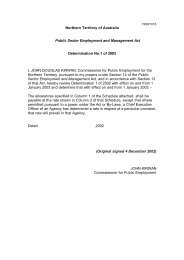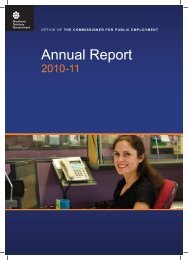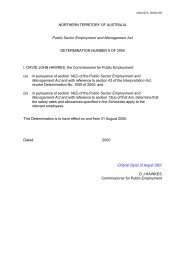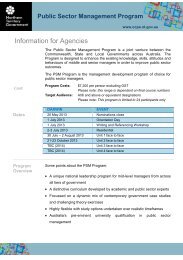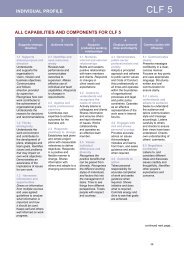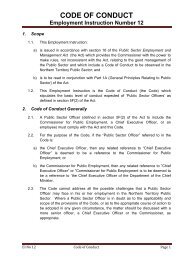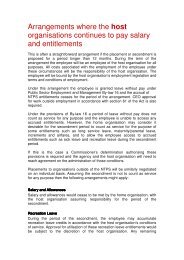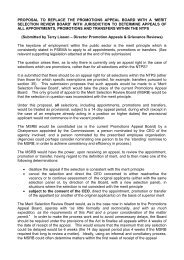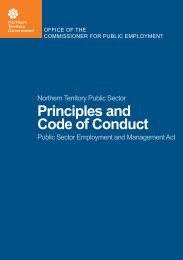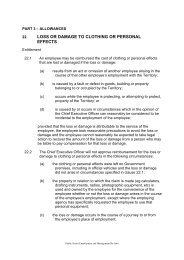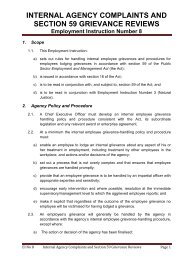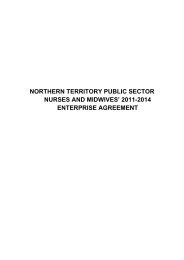Acknowledgement and Welcome to Country - Office of the ...
Acknowledgement and Welcome to Country - Office of the ...
Acknowledgement and Welcome to Country - Office of the ...
You also want an ePaper? Increase the reach of your titles
YUMPU automatically turns print PDFs into web optimized ePapers that Google loves.
Who <strong>to</strong> Ask<br />
Event organisers need <strong>to</strong> ensure that <strong>the</strong> Traditional Cus<strong>to</strong>dians are involved in<br />
<strong>the</strong> <strong>Welcome</strong> <strong>to</strong> <strong>Country</strong> ceremony. The <strong>Welcome</strong> <strong>to</strong> <strong>Country</strong> is a right <strong>of</strong> <strong>the</strong><br />
local Traditional Cus<strong>to</strong>dians <strong>and</strong> not a privilege; it is not about political<br />
correctness or <strong>to</strong>kenism. Aboriginal <strong>and</strong> Torres Strait Isl<strong>and</strong>er people employed<br />
at <strong>the</strong> local level in agencies may be able <strong>to</strong> advise organisers about <strong>the</strong><br />
Traditional Cus<strong>to</strong>dians.<br />
It is also advisable <strong>to</strong> seek advice from more than one source when establishing<br />
<strong>the</strong> local Traditional Cus<strong>to</strong>dians. Once this advice is sourced, Aboriginal <strong>and</strong><br />
Torres Strait Isl<strong>and</strong>er networks within <strong>the</strong> NTG agencies will seek advice from a<br />
number <strong>of</strong> additional groups that may include:<br />
• Local community people such as a community chairperson;<br />
• The Nor<strong>the</strong>rn, Central, Tiwi or Anindilyakwa L<strong>and</strong> Councils; <strong>and</strong>,<br />
• Local Aboriginal <strong>and</strong> Torres Strait Isl<strong>and</strong>er organisations.<br />
It is crucial <strong>to</strong> invite local Aboriginal <strong>and</strong> Torres Strait Isl<strong>and</strong>er representatives in<strong>to</strong><br />
any planned discussions at <strong>the</strong> onset <strong>to</strong> work <strong>to</strong>ge<strong>the</strong>r <strong>to</strong> decide on when <strong>and</strong><br />
where ceremonies <strong>and</strong> acknowledgements should take place, <strong>the</strong> format <strong>of</strong> <strong>the</strong><br />
ceremony, who could <strong>and</strong> should be involved <strong>and</strong> an appropriate level <strong>of</strong><br />
remuneration.<br />
Making <strong>the</strong> initial contact with appropriate Traditional Cus<strong>to</strong>dians <strong>of</strong> country on<br />
which <strong>the</strong> meeting, event or function is <strong>to</strong> take place may not be a simple<br />
process. The initial connection process is <strong>of</strong>ten <strong>the</strong> most challenging. Observing<br />
Aboriginal <strong>and</strong> Torres Strait Isl<strong>and</strong>er pro<strong>to</strong>col includes allowing time for traditional<br />
decision making <strong>and</strong> discussion among Traditional Cus<strong>to</strong>dians. This can take<br />
some time <strong>and</strong> should be fac<strong>to</strong>red in<strong>to</strong> <strong>Welcome</strong> <strong>to</strong> <strong>Country</strong> planning processes.<br />
Not all Aboriginal <strong>and</strong> Torres Strait Isl<strong>and</strong>er people can perform a <strong>Welcome</strong> <strong>to</strong><br />
<strong>Country</strong> as it must be given by an appropriate person such as a recognised Elder<br />
within <strong>the</strong> local community. In some parts <strong>of</strong> <strong>the</strong> Terri<strong>to</strong>ry <strong>the</strong>re may be disputes<br />
about who <strong>the</strong> Traditional Cus<strong>to</strong>dians are. This should be recognised as an effect<br />
<strong>of</strong> dispossession where people have been dislocated from <strong>the</strong>ir l<strong>and</strong> <strong>and</strong> have<br />
returned <strong>to</strong> an area where <strong>the</strong>y may not be accepted by some as Traditional<br />
Cus<strong>to</strong>dians.<br />
When organising a <strong>Welcome</strong> <strong>to</strong> <strong>Country</strong> for an event, organisers need <strong>to</strong> provide<br />
<strong>the</strong> Traditional Cus<strong>to</strong>dians (in some places <strong>the</strong>re are more than one group) with<br />
information on <strong>the</strong> <strong>the</strong>me <strong>and</strong> purpose <strong>of</strong> <strong>the</strong> event. Elder/s representing <strong>the</strong><br />
Traditional Cus<strong>to</strong>dians may choose <strong>to</strong> include in <strong>the</strong> welcome a traditional focus<br />
<strong>to</strong> <strong>the</strong> <strong>the</strong>me or purpose <strong>of</strong> <strong>the</strong> event. Organisers should also respectfully request<br />
that if a welcome is in language that it be translated in<strong>to</strong> English so that <strong>the</strong><br />
audience underst<strong>and</strong>s <strong>the</strong> welcoming message.<br />
- 5 -



